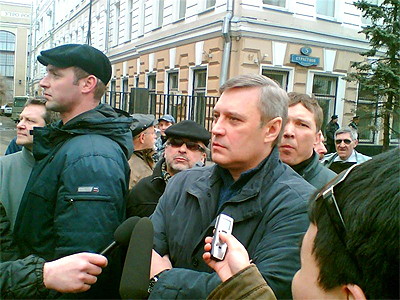Oppositionist Kasyanov heads up renamed PARNAS

(Interfax – July 5, 2015)
Mikheil Kasyanov has been elected as the sole chairman of the PARNAS Party.
Kasyanov’s candidacy was favored by a majority of delegates at a party congress, an Interfax correspondent reported.
The delegates also elected three deputy chairmen: senior party member Ilya Yashin, Vladimir Kara-Murza Jr. and party secretary Konstantin Merzlikin.
Kasyanov was the only candidate nominated for the PARNAS party leader. His deputy candidates also included Natalya Pelevina, Grigory Satarov and Olga Shorina. The latter two later withdrew their candidacies.
Earlier the congress delegates narrowly voted (by a single vote) to change the party charter and make amendments changing the structure of the party leadership and replacing the institution of co-chairpersons with a classical chairman and deputy chairmen.
In addition, it was decided at the congress to rename RPR-PARNAS as PARNAS. According to Kasyanov, this name “falls better on the eyes and ears of voters.”
At the same time, at the party congress delegates were introduced to a democratic coalition platform that PARNAS and its allies will take to State Duma elections.
The document lists 14 spheres where the party plans change and improvement in the event it comes to power.
First and foremost is public control over government. To that end, the party plans to scrap the “archaic procedure” whereby a voter can only vote in the constituency where he or she is registered as a permanent resident, and abolish the permanent resident registration system altogether, according to the draft document.
The party proposes shifting the election of the Federation Council to the voters and criminalizing the administrative interference with election and political competition.
The coalition has announced its intention to fully remove state control over mass media and privatize all mass media outlets that are owned by the state, directly or indirectly.
As far as taxes are concerned, the democratic coalition is planning to reduce the tax burden on small and medium-sized businesses and a gradual transition to a system that largely relies on income taxation.
The coalition also has announced full departure from “grey salaries” and plans to increase tobacco and spirits excise tax.
In its regional policy, the coalition is planning to introduce direct elections of magistrates and heads of municipalities and regions. With regard to the judicial system, the opposition coalition vows to take all steps to eliminate the judicial “administrative vertical,” for which purpose it is planning to scrap the laws whereby candidates for Supreme and Constitutional presidents and deputies are proposed to the Federation Council by the country’s president.
The coalition is also planning to strip court presidents of the powers that make judges dependent on them.
To fight corruption, the coalition will set up an independent authority responsible for the national anti-corruption policy. It is also planning to introduce an institution of independent prosecutors to investigate the crimes of high-ranking officials, and to ratify Article 20 of the UN Convention against Corruption.
On public safety, the coalition is planning to remove some of non-core duties and cut staff numbers in the police force and the Federal Security Service.
The coalition’s priorities also include police decentralization and making law enforcement agencies more accountable to the public, as well as the humanization and cleanup of the penitentiary system.
On foreign policy, the coalition is planning a shift from “the policy of mutual nuclear deterrence to one of strategic nuclear partnership.”
The coalition has announces its intention to cooperate with NATO on the basis of dominating shared values and interests.
On economy, the united opposition is set to conduct a large-scale amnesty for entrepreneurs, liquidate all state corporations and conduct a budget maneuver to shift the bulk of assets from the military and police sector into the human-capital area: education, science and health care.
On culture, the coalition is planning to move control over grants and competition procedures from the state to public experts.
On state apparatus, the opposition is planning to secure maximum transparency and accountability of any government bodies and develop mechanisms for public participation in central and local government activities, and to reduce the spheres of “secrecy” by declassifying files dating back more than 50 years ago.
[featured image is file photo]
